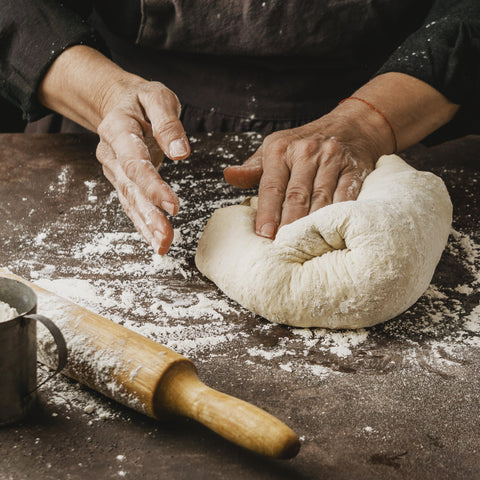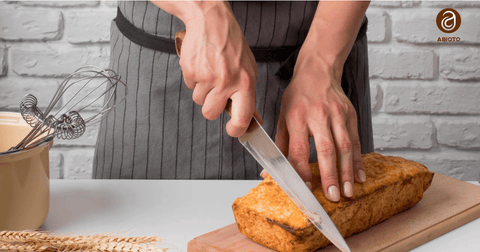If you’ve fallen in love with the slow, rhythmic process of making sourdough, you know there’s something deeply satisfying about watching flour, water, salt, and starter transform into a loaf that’s crusty on the outside and airy inside. But here’s the part many bakers overlook: the humble bowl you use can quietly make or break the process.
Sure, you could grab any old mixing bowl from the back of your cupboard. But if you’ve ever had dough stick like glue, collapse mid-rise, or just feel like it’s fighting you every step of the way, your bowl might be part of the problem.
Let’s break down what makes a bowl not just “good enough” but perfect for sourdough bread maker, whether you’re prepping a quick midweek loaf or a weekend showstopper.
Why the Bowl You Choose Actually Matters?
Sourdough is alive. It grows, it stretches, it bubbles, it’s like a little pet you feed and nurture. And like any living thing, it reacts to its environment.
The right bowl isn’t just about convenience. It:
-
Keeps your dough at a steady, cozy temperature so yeast and bacteria can work their magic.
-
Gives enough space for a strong, even rise.
-
Prevents unwanted reactions with the acidity in sourdough.
-
Makes handling and transferring dough less of a sticky disaster.
It’s like having the right shoes for a long run; you could wear flip-flops, but you’ll enjoy the process a lot more with the right gear.
The Best Bowl Materials for Sourdough
You’ve got options, but each has its own personality.
Stainless Steel: Light, Durable, and Low-Maintenance
If you bake often (and let’s be honest, once sourdough grabs you, it’s hard to stop), stainless steel is your best friend. It’s non-reactive, so it won’t mess with the flavor, and it’s light enough to lift even when you’ve got a double batch inside.
Abioto’s stainless steel bowls go the extra mile; they’ve got that deep curve that keeps flour clouds contained and dough from climbing over the edges during mixing. Easy to clean, nearly impossible to break, what’s not to love?
Glass: When You Want to See the Action
Glass bowls have one major perk: you can actually watch your dough rise. There’s something strangely satisfying about spotting those first little bubbles or noticing how much your dough has puffed up since you last peeked.
They’re also completely non-reactive and great for tracking fermentation progress. Just keep in mind that glass is heavier and a little more fragile, so maybe skip it if you’re a butterfinger in the kitchen.
Ceramic: The Cozy Classic
Ceramic bowls feel like they belong in a farmhouse kitchen, but they’re not just pretty. They hold heat well, which helps keep your dough happy during long proofs, especially in cooler kitchens.
Abioto’s ceramic bowls strike a balance between style and practicality. They’re heavy enough to stay put while you’re kneading but smooth enough inside to release dough without a fight.
Rattan Proofing Baskets: The Finishing Touch
These aren’t for mixing, but once your dough is shaped, a rattan banneton is where you send it for that final rise. It supports the dough’s shape, helps draw out a little excess moisture for a better crust, and leaves those beautiful spiral flour patterns you see on artisan loaves.
Abioto’s proofing baskets are made with natural rattan, giving you that professional bakery look without the guesswork.
How Size and Shape Play a Role?
Even the best material won’t help if your bowl’s the wrong size.
-
Go bigger than you think: Your dough should have at least twice the space it needs after mixing to expand without feeling cramped.
-
Shape matters: Wide, shallow bowls make mixing and folding easy. Deeper bowls are great for longer ferments when you want to help the dough hold its form.
-
Smooth is your friend: A slick, even surface means less sticking and easier cleaning.
Abioto’s bowls are designed with these details in mind, so you’re not wrestling your dough out of a rough corner or narrow base.
Picking the Right Bowl for Your Baking Style
The truth? There’s no single “best” bowl, there’s the one that fits how you bake.
-
Daily baker: Stainless steel is quick to clean and easy to handle.
-
Occasional baker: Ceramic gives you that “event baking” charm and heat retention.
-
Obsessed artisan: You’ll probably want stainless for mixing, glass or ceramic for bulk fermentation, and a rattan basket for proofing.
Most serious bakers keep more than one type around. That way, you’re covered whether you’re making a quick lunchtime loaf or prepping three boules for a dinner party.
Caring for Your Bowl So It Lasts
Sourdough tools aren’t disposable; treat them right, and they’ll see you through years of bakes.
-
Clean promptly: Dough turns into cement if you leave it too long.
-
Dry completely: Especially for wood or rattan, to avoid mold.
-
Don’t soak rattan: Just dust it out and let it air dry.
Abioto designs its bowls and baskets with ease of care in mind, so maintenance is quick and painless.
Why Abioto Bowls Stand Out?
At Abioto, every baking tool is made with the reality of a baker’s kitchen in mind: sticky hands, flour on the counter, timers going off at the wrong moment. Our bowls aren’t just functional; they’re meant to make your process smoother and your results better—an essential part of the best bread making kit for any home baker.
Whether you’re just starting your sourdough journey or you’ve been at it for years, the right tools let you focus on what you love, creating bread that smells amazing, tastes incredible, and makes people come back for seconds.
Your Bread Deserves the Best
You wouldn’t skimp on your flour or rush your proofing time, so why compromise on the bowl that’s with your dough every step of the way?
If you’re ready to upgrade your baking gear and make every loaf a little easier (and a lot more beautiful), check out Abioto’s collection of bowls, proofing baskets, and sourdough essentials.
Your starter is already doing its best. Give it the home it deserves.
FAQ’s
1. Can I use a plastic bowl for sourdough?
Yes, but plastic can hold odors and scratch easily, which may trap bacteria over time.
2. Is stainless steel safe for sourdough?
Absolutely, it's non-reactive, lightweight, and easy to clean.
3. Do ceramic bowls help dough rise better?
Yes, they retain heat well, which is great for consistent fermentation.
4. Why avoid aluminum bowls?
Sourdough’s acidity can react with aluminum, affecting taste and safety.
5. How big should my sourdough bowl be?
Choose one that’s at least twice the size of your dough after mixing.




Comments (0)
There are no comments for this article. Be the first one to leave a message!